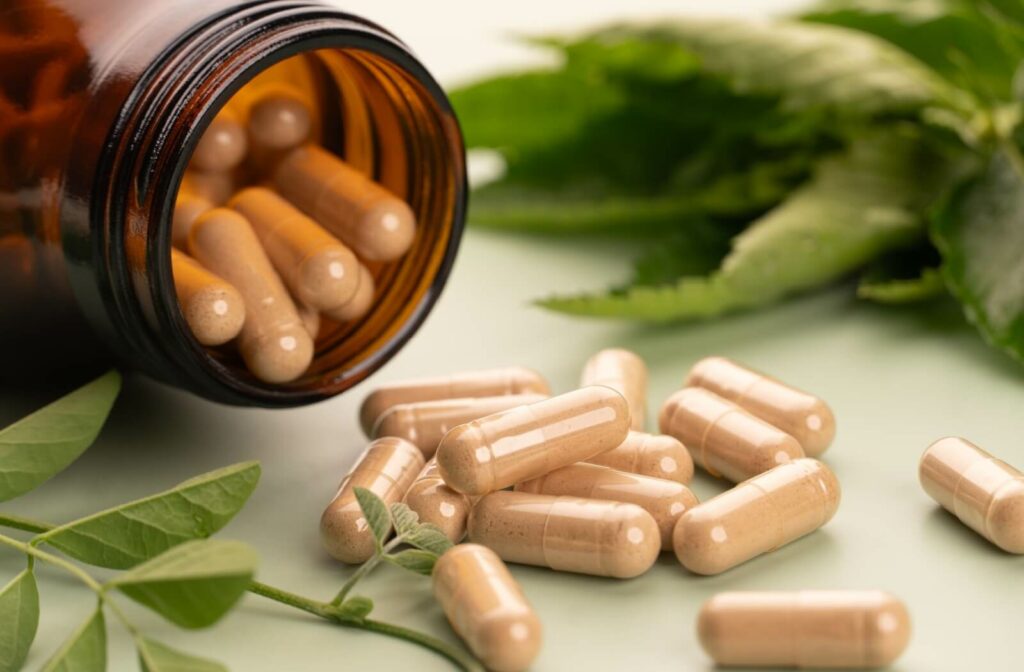Sitting in the exam chair for your routine eye exam isn’t the only way you can support your visual health. There are simple and effective eye-friendly habits you can implement at home as well. The challenge lies in consistency and figuring out what actually works.
In the vitamin realm, we’ve got you covered. The best vitamins for age-related macular degeneration (AMD) include:
- Vitamin C
- Vitamin E
- Omega-3 Fatty Acids
- Zinc
- Copper
- Lutein and Zeaxanthin
The Role of Vitamins & Nutrients in AMD Management
When we talk about “healthy vision,” people usually think about the strength of their glasses prescription. Refractive errors can be complex in certain cases, but for the most part, they’re easy to address with the right corrective lenses.
Eye diseases, on the other hand, are a lot more challenging to navigate.
The trouble with many eye diseases, including age-related macular degeneration (AMD), is that they can develop silently. Without consistent routine eye exams, many people may not even realize their eyes are going through abnormal changes until the condition progresses and the damage ensues.
AMD affects the macula, a structure within the retina responsible for sharp, detailed vision. This disease falls into 2 main categories:
- Dry AMD: The most common form, characterized by gradual vision loss due to the thinning of the macula.
- Wet AMD: A more severe but less common type, caused by abnormal blood vessel growth under the retina that can leak fluid and damage the macula.
While the exact cause of macular degeneration remains uncertain, risk factors include aging, genetics, smoking, poor diet, and oxidative stress. Oxidative stress, in particular, plays a significant role in damaging cells in the retina, which is where nutrition steps in to help.
Supporting Eye Health with Vitamins
You are what you eat.
Nourishing your body from the inside out is a great way to support all areas of your health, not just your eyes. Eating a diet of colourful, rich foods makes it easier to absorb all the essential vitamins and minerals that keep your body full and energized.
Vitamin C
Vitamin C plays a crucial role in protecting the eyes from oxidative damage. It helps your body regenerate and repair tissues, which can help prevent the onset and progression of eye conditions, including AMD.
Sources of vitamin C include:
- Fresh fruits like oranges, kiwis, strawberries, grapefruit, and papayas
- Vegetables such as bell peppers, broccoli, and kale
Getting your vitamins from whole foods is ideal, but it’s more than okay to supplement sources of vitamin C if you have trouble meeting your daily intake through diet alone.
Vitamin E
Vitamin E works alongside vitamin C to provide antioxidant protection. It also helps maintain healthy retinal tissue.
Sources of vitamin E include:
- Nuts and seeds, such as almonds and sunflower seeds
- Vegetable oils like sunflower, safflower, and wheat germ oil
- Leafy greens like spinach and Swiss chard
These supplements are readily available, but it’s better to stick with the recommended dosage as excessive amounts can pose health risks. When in doubt, ask your eye doctor.

Omega-3 Fatty Acids
Omega-3 fatty acids are crucial for retinal development and function. Research shows these healthy fats may also reduce inflammation and support overall eye health.
Fantastic sources of omega-3s include:
- Fatty fish like salmon, mackerel, tuna, and sardines
- Plant-based sources such as flaxseeds, chia seeds, and walnuts
- Fish oil or algae-based omega-3 supplements
Zinc
Zinc plays a vital role in transporting vitamin A from the liver to the retina, to produce melanin, a pigment that protects your eyes. Great sources of zinc include:
- Shellfish like oysters
- Lean meats, poultry, and eggs
- Legumes such as chickpeas and lentils
- Nuts, seeds, and whole grains
Zinc supplementation can be helpful, but it’s important to monitor your intake. High zinc levels can make it harder to absorb other essential nutrients, like copper.
Copper
Copper is a mineral that helps maintain healthy retinal tissue. It balances out zinc levels in the eyes, keeping them within an ideal range. Copper is also important for healthy red blood cells, which deliver oxygen and nutrients to the eye.
Sources of copper include:
- Beans
- Nuts
- Leafy greens
- Whole grains
- Shellfish
Lutein & Zeaxanthin
Lutein and zeaxanthin are carotenoids that are naturally concentrated in the macula, where they protect the retina by filtering out harmful blue light.
You can find these vitamins in foods such as:
- Dark leafy greens like spinach, kale, and collard greens
- Egg yolks, corn, and orange peppers
- Zucchini and squash
It’s challenging to get therapeutic levels of lutein and zeaxanthin solely from diet, so many people find supplements helpful.
Safeguard Your Eyesight
Nutrition is just one piece of the puzzle when it comes to managing macular degeneration. Here are other helpful ways to support your visual health:
- Protect your eyes from UV light: Wearing sunglasses with UV protection can shield your eyes from harmful ultraviolet rays that may contribute to macular degeneration.
- Quit smoking: Smoking greatly increases your risk of AMD. Quitting this habit is one of the most positive changes you can make for your overall health, including your vision.
- Move your body: Staying active promotes healthy blood flow throughout your body, including your eyes. Activities like walking, swimming, and yoga can improve circulation and overall well-being while being low impact.
- Have routine eye exams: Your optometrist can detect early signs of AMD and monitor its progression for timely intervention. The sooner we take action, the better.
Taking Control of Your Eye Health
There is no miracle pill to prevent or cure AMD, but there are measures you can take to safeguard your eyesight and slow its progression. Eating a balanced diet and taking supplements to support your eye health are just a small piece of a larger puzzle.
Please don’t hesitate to ask our Maple Ridge Eye Care team about any questions you might have related to eye health and nutrition. Or, connect with us to book an appointment for your routine eye exam.


